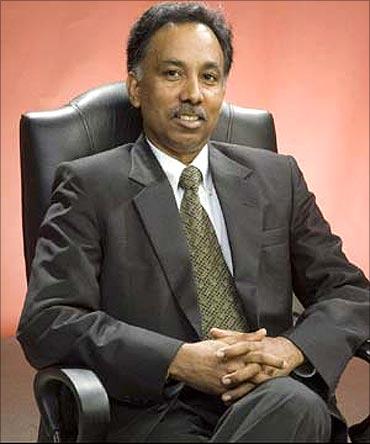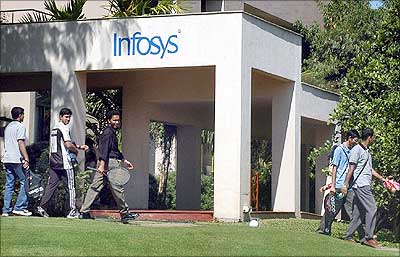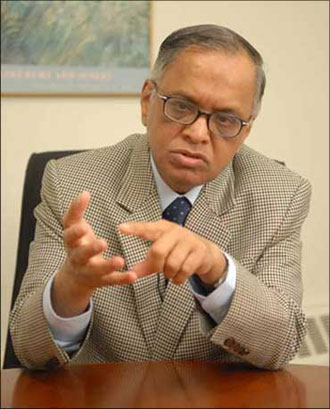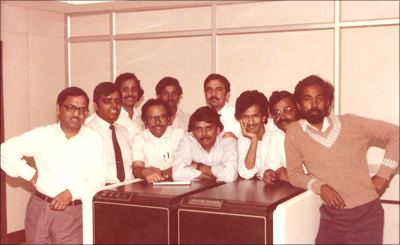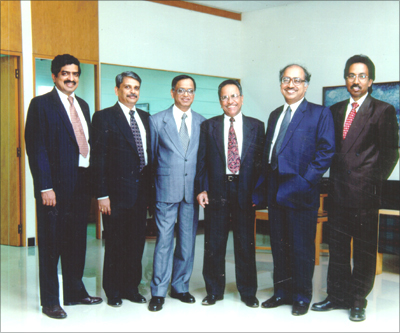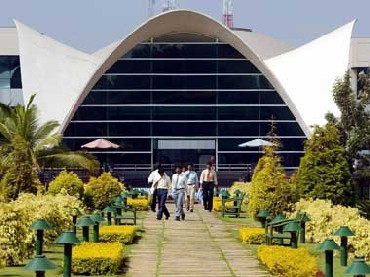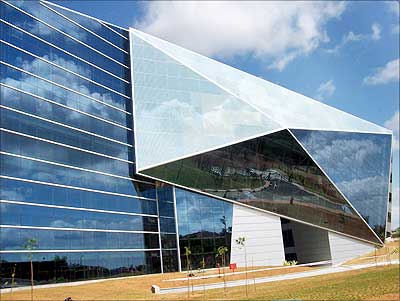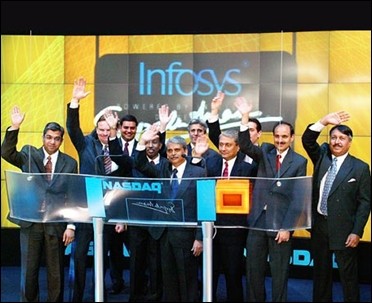 | « Back to article | Print this article |
S D Shibulal: 'Middle class risk taker' who became Infosys CEO
After several attempts and many phone calls, (Infosys CEO) S D Shibulal finally takes time out for tea with Business Standard, not at a favourite eatery of his -- he confesses he is not a foodie -- but at Crowne Plaza that is next to the Infosys campus in Electronics City just outside Bengaluru.
He comes in on the dot. The first round of tea is too light; the stronger brew that the coffee shop quickly serves next is more to his liking.
After a look at the lighter fare on the menu he opts for vada pav, which he has not eaten in ages. It takes him back to the days 33 years ago when he acquired a taste for it in Mumbai where he had gone after a masters in Physics in Kerala to work for BEST, the operator of the iconic red buses.
Click NEXT to read on . . .
S D Shibulal: 'Middle class risk taker' who became Infosys CEO
We go for pakora and ham and cheese sandwich.
The discussion starts off on the culture among Infosys' founders. "We have all been here for 32 years. You become very cohesive over a period of time. It is also very important that the value systems are aligned if you want to stay together for a long time," Shibulal says.
He describes the culture at the top in Infosys as "based on Indian middle class values. Most of our parents were teachers or government employees. I don't think anybody among our parents was in business."
Click NEXT to read on . . .
S D Shibulal: 'Middle class risk taker' who became Infosys CEO
So that made all of them who quit paid jobs risk-takers?
"If you look back to 1981, it was completely different. We were quite young, though all except Dinesh were married. None of us had children. Our ability to take risk at that point of time was slightly higher. In that sense, the biggest risk was taken by Mr Murthy who was already in an extremely well-positioned and well-paid job."
There were "possibilities and opportunities -- big and challenging -- travelling, seeing the world, experiencing, understanding other cultures. And Mr Murthy was in any case very charismatic and well-respected."
Click NEXT to read on . . .
S D Shibulal: 'Middle class risk taker' who became Infosys CEO
Infosys wasn't always the poster boy it is today. "The first 15 years were tough. Until 1995 or so, growth was quite slow and the environment difficult. How difficult it was to get a phone, a car or even a bank loan! The last was impossible because the industry was not known at that point in time."
They did not sell out because "we had no exit plans. We wanted to build something for which we were willing to wait. Actually, we did not know what we were waiting f#8744 we were willing to make it happen."
For Shibulal, "the first risk was to go to Bombay (now Mumbai). I was the only child, and my parents were really keen that I stay at home and take up a teaching job."
Click NEXT to read on . . .
S D Shibulal: 'Middle class risk taker' who became Infosys CEO
His father was a government ayurvedic doctor and mother an employee with the state excise department. Those days a job was difficult to come by and there were only two opportunities after masters -- teaching or joining a bank.
In 1978, BEST was making lateral recruitments for the first time, for officers' posts related to computers. "I had no idea about computers and did not see one for a year after joining."
"BEST, a state undertaking, was a great organisation, diverse and cosmopolitan. In successful organisations, you have to allow employees to learn. Managers make all the difference. I had the privilege of working under some absolutely great teachers and managers."
Click NEXT to read on . . .
S D Shibulal: 'Middle class risk taker' who became Infosys CEO
He remembers Kumar Anjarya -- "a Gandhian kind of person" -- who conducted the training. "For 28 years, until he passed away two years ago, I used to go and see him once or twice every year. He developed my foundation in computer science. That's how I entered the world of computers."
The project Shibulal worked on involved relaunching everything, billing system and the like, in COBOL. They decided to buy a data jammer for which Patni was the systems integrator.
"They came to train us and that's how I came across Patni. I have attended Raghavan's classes." After two-and-a-half years in BEST he joined Patni and after six months was invited to join Infosys.
Click NEXT to read on . . .
S D Shibulal: 'Middle class risk taker' who became Infosys CEO
But he spent a year in Patni because people had to complete their projects.
In his 30 years in Infosys "there is nothing that I have not done. I was the first sales person, I have done account management. I launched the Infosys Internet Consulting Practice. I am a network expert. I became head of delivery in 1999. Then I started running sales again in 2006 when Basab [Pradhan, who headed Infosys' global sales from 2002 to 2005; he has rejoined Infosys since] left. For the last 10 years, I have done operations one way or other, and scaling it up. I have probably handled more diverse roles because of my background and my interest. I like to get things done. It is not about the role. Execution is what I like."
In the early days selling for India "was very difficult. When I used to go out they would ask questions like where are you from; do you speak English; what makes you feel that you can deliver software for us; do you have cows on the road -- even now they ask that. I used to start my presentation with the world map showing, here is India, here is Bengaluru and I speak English."
Click NEXT to read on . . .
S D Shibulal: 'Middle class risk taker' who became Infosys CEO
We asked Shibulal to describe Infosys' game--changing years.
"If you look at the history of Infosys, game-changing occurred much before it did for the industry, which was in 1996-97 when Y2K and the Internet came together. Somebody has to be ready with a certain set of things for the game-change."
"The first game-changer was in 1985-86 when we said we will deliver things from India instead of everybody travelling to the United States or Europe. In 1985, we had one office here. Clients were not confident about giving us work here. We created some track record by doing it there (on site), then we said we will do it in India and bring in back."
Click NEXT to read on . . .
S D Shibulal: 'Middle class risk taker' who became Infosys CEO
"It was bootstrapping. So we created the global delivery model, saying we can actually do things in a split manner. But transporting software was difficult. We were carrying it on floppies and tape drive."
"In 1992, we said we will install a network hub in the US -- I think we were either the first or, at best, the second. We created a network hub in Boston and started linking clients to it. That is when the global delivery model went to the next level, when we installed our first network in 1993."
Infosys capitalised on the Internet and Y2K boom by adding a lot of clients, gaining a lot of knowledge, growing.
Click NEXT to read on . . .
S D Shibulal: 'Middle class risk taker' who became Infosys CEO
Then the bubble burst. But by then it had taken another set of strategic decisions. In 1999, it started to introduce new service lines that created the need to build a lot of domain and consulting capability.
In 2002, the Infosys Business Consulting Service (IBCS) started. "Many people say we are a risk-averse company, but if you look at all these things we have done, these are the most risky things. In the middle of the bubble burst we went out and started the consulting practice."
We decide we have let him hold forth for too long. So we interject: people like Accenture claim they are learning what Infosys started much faster than Infosys is able to master Accenture's USP, consulting.
Click NEXT to read on . . .
S D Shibulal: 'Middle class risk taker' who became Infosys CEO
"Their copying the global delivery model in a sense is easier than our copying the consulting part. Copying is easier than having it in the DNA. If 25 per cent of our senior management team is sitting here, it is totally integrated in the DNA."
"Are we having the same problem in consulting? The honest answer is yes. That is why we went through IBCS, then we had to integrate; then we restarted with Infosys Consulting and now we have integrated. In consulting, now we have reached a stage where it is part of our DNA. Now the challenge is only the scale."
Then we gently nudge him on margins, Infosys's great plus. Tata Consultancy Services is within nudging distance. He is candid: "Yes . . . they did a good job. Nothing wrong in that! We should be worried about our margins going down."
Click NEXT to read on . . .
S D Shibulal: 'Middle class risk taker' who became Infosys CEO
Future economic growth is in India but Infosys is low on India. He is equally frank. "Yeah . . . we are about one per cent of the service revenue. We were zero per cent some three years back. We now give more attention to India."
We try to draw him on the role of K V Kamath, the new Infosys chairman. A man like him is unlikely to remain on the sidelines, we point out. But this time Shibulal does not bite.
"There is a well-defined role for a non-executive chair and he is a thorough professional. There is a defined role for a CEO and defined role for an executive co-chair." On that we call it a day.
